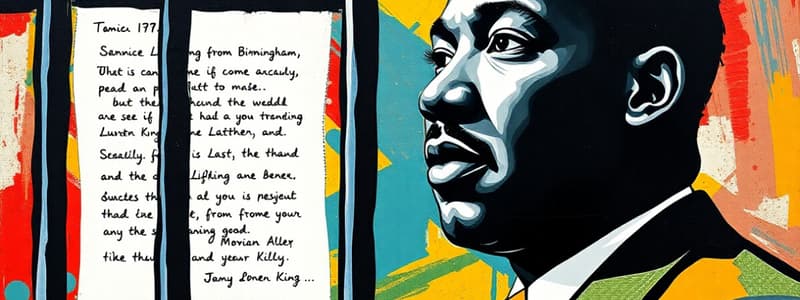Podcast
Questions and Answers
What was the main reason for Martin Luther King Jr.'s arrest on April 12, 1963?
What was the main reason for Martin Luther King Jr.'s arrest on April 12, 1963?
- He was inciting a riot.
- He led a violent protest.
- He did not have a parade permit. (correct)
- He failed to cooperate with police.
Who was the primary audience for Martin Luther King Jr.'s Letter from Birmingham Jail?
Who was the primary audience for Martin Luther King Jr.'s Letter from Birmingham Jail?
- Fellow clergy and religious leaders. (correct)
- The general public.
- Local businessmen opposing the protests.
- Civil rights activists outside Birmingham.
What significant theme does Martin Luther King Jr. emphasize in his Letter from Birmingham Jail?
What significant theme does Martin Luther King Jr. emphasize in his Letter from Birmingham Jail?
- The responsibility of citizens to engage in peaceful protest. (correct)
- The futility of social justice movements.
- The need for immediate government intervention.
- The importance of violent resistance.
What was the reaction of the local clergymen to Martin Luther King Jr.'s campaign?
What was the reaction of the local clergymen to Martin Luther King Jr.'s campaign?
In what manner did Martin Luther King Jr. circulate his Letter from Birmingham Jail?
In what manner did Martin Luther King Jr. circulate his Letter from Birmingham Jail?
What does Martin Luther King Jr. counter in his Letter from Birmingham Jail regarding his image in the community?
What does Martin Luther King Jr. counter in his Letter from Birmingham Jail regarding his image in the community?
Which publication was NOT mentioned as a platform for circulating the Letter from Birmingham Jail?
Which publication was NOT mentioned as a platform for circulating the Letter from Birmingham Jail?
In which memoir was a portion of the Letter from Birmingham Jail included?
In which memoir was a portion of the Letter from Birmingham Jail included?
What does Martin Luther King Jr. identify as a primary obstacle to African Americans' pursuit of freedom?
What does Martin Luther King Jr. identify as a primary obstacle to African Americans' pursuit of freedom?
What is the main reason Martin Luther King Jr. gives for the necessity of direct action?
What is the main reason Martin Luther King Jr. gives for the necessity of direct action?
According to Martin Luther King Jr., what is a flaw in the concerns expressed by the local clergymen regarding the protests?
According to Martin Luther King Jr., what is a flaw in the concerns expressed by the local clergymen regarding the protests?
What key concept does Martin Luther King Jr. use to argue for the urgency of civil rights actions?
What key concept does Martin Luther King Jr. use to argue for the urgency of civil rights actions?
How does Martin Luther King Jr. compare the Birmingham protestors?
How does Martin Luther King Jr. compare the Birmingham protestors?
What outcome does Martin Luther King Jr. hope to achieve by creating discomfort in society?
What outcome does Martin Luther King Jr. hope to achieve by creating discomfort in society?
What does King mean by stating that 'injustice anywhere is a threat to justice everywhere'?
What does King mean by stating that 'injustice anywhere is a threat to justice everywhere'?
Flashcards
Martin Luther King Jr.'s Arrest
Martin Luther King Jr.'s Arrest
Martin Luther King Jr. was arrested in Birmingham, Alabama, on April 12, 1963, for participating in a non-violent anti-segregation march without a permit.
Letter from Birmingham Jail
Letter from Birmingham Jail
A letter written by Martin Luther King Jr. while imprisoned in Birmingham, addressed to clergymen who criticized his methods of civil disobedience.
Intended Audience
Intended Audience
The letter was aimed at local clergymen and religious leaders who had criticized King's civil rights campaign and published a 'Call to Unity.'
Civil Disobedience
Civil Disobedience
Signup and view all the flashcards
Thesis of Letter
Thesis of Letter
Signup and view all the flashcards
Non-violent Protests
Non-violent Protests
Signup and view all the flashcards
Social Justice
Social Justice
Signup and view all the flashcards
Birmingham Protests
Birmingham Protests
Signup and view all the flashcards
King's Argument: Direct Action
King's Argument: Direct Action
Signup and view all the flashcards
King's Disappointment: White Moderates
King's Disappointment: White Moderates
Signup and view all the flashcards
King's Critique: White Church
King's Critique: White Church
Signup and view all the flashcards
King's Warning: Oppression
King's Warning: Oppression
Signup and view all the flashcards
King's Philosophy: Injustice
King's Philosophy: Injustice
Signup and view all the flashcards
King's Use of Time
King's Use of Time
Signup and view all the flashcards
King's Purpose: Discomfort
King's Purpose: Discomfort
Signup and view all the flashcards




